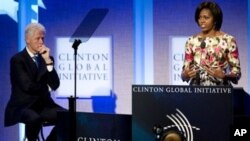The Clinton Global Initiative has concluded its annual meeting in New York with multi-billion dollar commitments from participants to help address problems of poverty, disease and injustice around the world.
Former President Bill Clinton told the CGI's final plenary session that the organization has garnered more than 1,950 commitments now valued at $63 billion impacting just under 300 million lives in about 170 countries.
Former Microsoft chairman Bill Gates told Mr. Clinton on stage he is worried rich countries may cut back on foreign aid in the aftermath of the global economic crisis.
"The money they spend, let's say, on Millennium Development goals - AIDS, medicines, vaccines, food, those things - will that suffer disproportionately when there's a change?"
CGI's ambitious global agenda seeks, among other things, to help empower women, to prevent human trafficking, to spread knowledge through computer technology, to fight global warming and support public health, including the removal of stigmas in some countries attached to such diseases as cancer.
Poverty of knowledge was mentioned at several CGI forums. Speaking at a news conference on the empowerment of women, Ann Cotton, director of Camfed International, said computers can address the lack of awareness that underpins many social problems.
"Give people technology and they will run with it," she said. "They will be excited by it, it improves their status; it particularly improves the status of girls and women."
The keynote speaker at the final CGI plenary, First Lady Michelle Obama, devoted her entire speech to American military veterans. She called on CGI participants involved in non-governmental humanitarian aid to hire veterans. She said they face serious social problems of their own, including unemployment, noting they leave the military with excellent experience.
"They go on regular humanitarian missions throughout the world, providing everything from food aid to medical care to help with construction," she said.
President Clinton ended the meeting with a discourse on optimism and pessimism by drawing an analogy to physics. He said supercolliders have shown there are more positive particles on a subatomic level than negative ones. He said people owe it to the next generation to make certain positive human forces outweigh the negative ones of violence and squalor.




